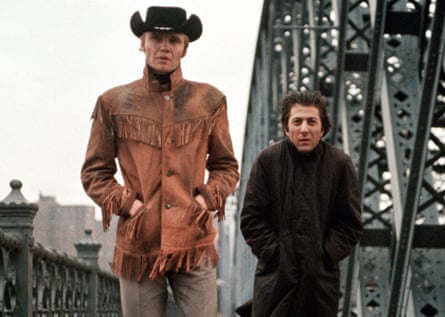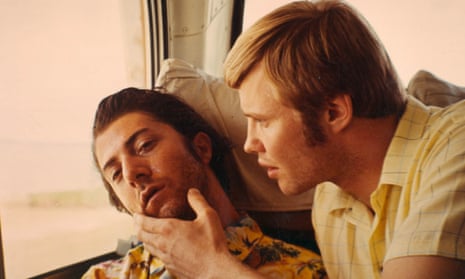I’m not one of those people who predict endings, but I am married to someone who is. Our mutual love of film brings out the real me: a chubby teenager with a highlighter, the TV Times and an Augustus Gloop chocolate stash, scheduling movie-watching as if life depended on it. But hearing him murmur “he’s going to die” 10 minutes past the opening credits makes me want to stuff overpriced popcorn into his mouth till he’s picking it out of his nostrils. I’m not totally cruel: I would allow a breathing hole, so we can watch the rest of the film in blissful silence. Luckily, after many years together, a tilt of my right eyebrow is enough to render him speechless.
I first watched Midnight Cowboy, on my own, during one of my teenage marathon sessions. I didn’t see it coming, that scene on the bus at the end. And when I watched it years later, I didn’t want to see it coming.
“I’m no cowboy but I’m a real stud,” Joe keeps telling us. Joe Buck (Jon Voight) is tall, tanned and beautiful but he’s a man with no one, passing through the script of a wretched life. Leaving behind more than one person’s quota of dreadful luck in small-town Texas – abandoned by a mother, raised by a grandmother and her creepy partner – memories float through his mind, with flashbacks of a horrific rape of himself and his girlfriend at the hands of a local gang. Joe’s promiscuity, a calling card for sexual abuse, is also his escape. He plans to milk those rich ladies of New York, and turn the tables on his sexual exploitation.
However, a few months in the city leave him sharp-cheekboned and pale. You wonder how many people it will take to screw him over before he realises that the only way to survive the urban jungle is to become a monstrous version of himself. Despite the bravado, Joe remains a man-boy, kind to the core and incapable of hurting others. As he admits at the end: “I’m not much of a hustler.” Bad luck follows him like a cloud. You want to shake him by those broad shoulders.
His unconventional relationship with Ratso (Enrico Salvatore Rizzo, played by Dustin Hoffman) is the closest thing to love that Joe has had in his life – it is no irony that this partnership is never sexual. Offering Joe food and shelter and cleaning his clothes (even if it is to earn money as his pimp), Ratso is the only one who places Joe’s needs above his own sexual gratification.
Just as Joe is starting to succeed at getting women to pay him for sex, Ratso’s health deteriorates. Joe makes his partner’s dreams of “Flawida” happen. As the bus heads south, Joe takes charge of Ratso’s incontinence and shame, using boyish humour: “You took a little rest stop that wasn’t on the schedule, is all.” And they both dissolve into giggles.
Joe is at peace, and because of Ratso’s dream, he has diverted his escape plan to a land of hope and coconut palms. Ratso tells Joe he wants to be known as Ricco, the cowboy boots go into the bin, and the morning sun kisses their faces. Hope beckons. And then Joe turns to Ratso, who has died with eyes open, staring down the road to Miami. Joe takes into his arms the most enduring love he has ever known, once again alone.

I cry out of shock at the normality of their demise. I cry at the women in cat’s eye glasses who just stare, void of compassion, as grotesque as those rich New York ladies and their lookalike dogs.
There are plenty of films which have an off-the-cliff ending, where the world stops. But usually with some sort of fanfare. It’s Joe’s unseen pain that has me bawling every time. I’m crying from a childish hope; the notion that things should get better, that it will be OK in the end. Even after the pointless death of Peter Fonda’s Wyatt in Easy Rider, I felt: well, at least he lived some.
With Ratso gone, there is no one to tell Joe’s story; no advocate: he’s just not articulate enough. His mind paralysed at the time of the abuse, Joe retreats into his childish alter ego, alone and scared. Maybe what stirs me most is the realisation that no one has ever loved Joe as much as Ratso. No one apart from us.

Comments (…)
Sign in or create your Guardian account to join the discussion